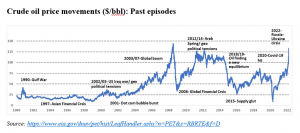
It is widely speculated that the RBI monetary policy committee may raise interest rates and change its stance to neutral. The CPI inflation is on the upper margin of the apex bank’s comfort zone, but it is fuelled by transport, health, oil & fats, and meat & fish. This means the spurt in inflation is transitory and, therefore, the policy action should not follow immediately. There is no need for the RBI to change its stance or the repo rate immediately. The wholesale inflation also is on the rise. The WPI data shows clearly that the prices are influenced by the spike in crude oil prices. It is clear how this factor plays out and this should not influence the policy immediately.
The US is aggressively raising interest rates. The US Federal Reserve says it would raise rates by 1.9% this year and there could be two hikes next year. The UK has also started raising interest rates whereas Australia has not effected any change in its policy rates. Among emerging economies, Brazil and South Africa have taken steps towards raising interest rates.
READ I Inflation threat: RBI may hike reverse repo rate by 15 bp
Growth vs inflation
There is a unique trend in the growth figures released by the World Economic Outlook. It says that in advanced countries, the growth pattern in 2022 is less than the growth estimation in 2021. The projections for 2023, none of the countries are projected to grow faster than in 2022. This is a cause of concern. India has crossed the $400 billion exports target and analysts need to carefully observe its impact in the years to come. India’s growth story hinges on crude prices hovering around $70-75 per barrel, but as we know that zone has already been crossed. There is no clarity on how long the current phase will last. One has to be cautious going forward.

On industrial production measured by IIP, India is doing well. The same is the case with the eight core industries. The RBI governor has said that the NPAs would rise to 6.9% while talking about the Financial Stability Report. This is a comfortable level. However, there are 12,000 odd cases that are waiting to get into NCLT. In NCLT, the data shows that most of the cases end up in liquidation and not resolution. There creates stress in the corporate sector as evident from 12,000 pending cases.
The fear of a possible fourth wave of Covid-19 still lingers and there is uncertainty about its occurrence. Contact services are normalising, schools have opened which shows that the situation is under control. We will have to wait and see how this reflects on tax collections and how the revenue of the government is improving. Market borrowing programme depends on this to a great extent.
READ I Lessons from Ukraine: India must launch digital rupee to compete with the yuan
RBI can ignore transitory inflation
At this point, it will be comfortable for the industry to know that the RBI continues with its cautious approach. It allows the economy to grow at a healthy rate. The green shoots are appearing and the contact services have restarted. , they are allowed to stabilise before the RBI makes any change in the stance or interest rate.
There is a surge in demand for gold, leading to an increase in the current account deficit. Gold serves as a hedge against uncertainty across various income streams. The free food programme started by the government during the Covid-19 pandemic is expected to be extended beyond September 2022, given the political economy aspect of the initiative.
This initiative contains the spread of poverty in the country, but has an implication on the government finances. In view of the fragile recovery, the RBI may like to consider assigning concessional rate of interest for loans extended to the health sector — pharma, hospital, rural health, and medical education.
Dr Charan Sigh is a Delhi-based economist. He is the chief executive of EGROW Foundation, a Noida-based think tank, and former Non Executive Chairman of Punjab & Sind Bank. He has served as RBI Chair professor at the Indian Institute of Management, Bangalore.

